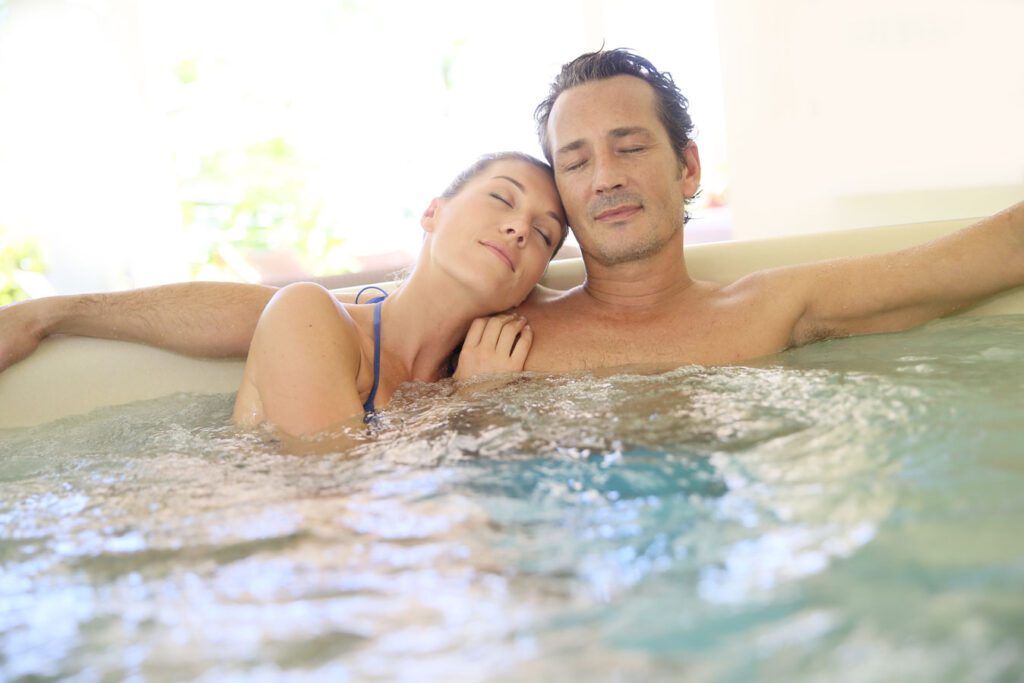
Hot Tubs Are Your Mental Health Oasis
Mental health awareness has grown significantly in recent years and owning a hot tub has been considered a key benefit to relieving stress.
We’re more open to discussing the challenges we face, from daily stress to chronic conditions like depression.
During Mental Health Week, the focus intensifies, encouraging us to prioritise mental well-being.
But what if there was a simple, accessible way to support your mental health at home?
Enter the hot tub – a haven of warmth, massage, and surprising benefits for your emotional state.
Escape the Everyday Hustle with your Hot Tub Spa
The modern world throws a lot at us.
Especially as the blue lights of screens – especially mobile phones bring deadlines closer, social media bombards us, and anxieties simmer beneath the surface.
This constant pressure can lead to chronic stress and anxiety, impacting our overall well-being.
For neurodivergent individuals, who may experience sensory overload or social challenges, navigating daily life can be even more demanding.
Hot Tubs Offer Mental Health Benefits Whilst You Soak
The good news from our Hot Tubs Surrey team tell us that there are ways to combat these challenges.
Hot tubs aren’t just about luxury; they offer a range of science-backed benefits for your mental health with hot water.
The team here have had direct customer feedback to substantiate the below
Stress Relief
Hot water works wonders on tense muscles. As your body relaxes, so does your mind. Studies have shown that hot tub use can lower cortisol, a key stress hormone.
This decrease creates a sense of calm and well-being, allowing you to decompress after a long day or after a competitive sport like golf.
Improved Sleep
We all know the frustration of a restless night.
Hot tubs can be a powerful ally in the fight for better sleep.
The warm water can lower your core body temperature, mimicking the natural pre-sleep dip.
This signal tells your brain it’s time to wind down, promoting a deeper, more restful sleep.
Quality sleep is vital for managing stress and improving overall mental health.
Pain Relief
Chronic pain can be a major drain on mental health.
For those with conditions like arthritis or back pain, the warmth and buoyancy of a hot tub can significantly ease muscle tension and joint pain. Hydrotherapy benefits are also well documented.
This pain relief from a hot tub translates to improved mood and a greater sense of well-being.
Endorphin Boost
Ever feel a surge of happiness after a good workout?
That’s thanks to endorphins, the body’s natural mood elevators.
Hot tub use also stimulates endorphin release, boosting your mood and leaving you feeling happy and positive.
This can be especially helpful for those experiencing mild depression or low mood.

The Power of Disconnection in a Neurodiverse World
Our world is constantly buzzing with information and stimuli.
Phones buzz, emails ping, and the news cycle spins.
It’s no wonder we feel overwhelmed.
One of the biggest benefits of a hot tub might be its ability to facilitate disconnection – especially for neurodivergent individuals who may be particularly sensitive to sensory overload.
Sinking into the warm water provides a dedicated space to unplug from technology and the stresses of daily life.
It creates a calming sensory experience, allowing you to process emotions, de-clutter your mind, and simply be present in the moment.
This disconnection can be particularly beneficial for those with conditions like ADHD or autism who may struggle with constant stimulation.
Hot Tubs Can Be a Calming Retreat For Those with Neurodiversity
While hot tubs offer a luxurious escape for everyone, their benefits can be particularly profound for individuals with neurodiverse conditions like Autism Spectrum Disorder (ASD) or Attention Deficit Hyperactivity Disorder (ADHD) .
Here’s how a hot tub can become a haven for sensory regulation, focus, and social interaction.
We are bombarded with sensory input.
For neurodivergent individuals, this can lead to overwhelm and meltdowns.
Studies by the National Autistic Society in the UK highlight the importance of sensory regulation strategies for autistic individuals.
A hot tub provides a calming sensory experience:
Warm Water:
Warm water provides deep pressure stimulation, similar to a weighted blanket. This can have a calming effect on the nervous system, reducing anxiety and promoting relaxation.
Gentle Massage:
The gentle massage jets from a 32amp hot tub offer proprioceptive input, which helps the body understand its position in space and can be grounding for those who experience sensory processing difficulties
Reduced Stimulation:
Immersing oneself in the hot tub can provide a physical and mental barrier from overwhelming external stimuli.
The sound of the bubbling water can also be a source of white noise, further reducing auditory distractions
Social Connection:
The calming and grounding effects of a hot tub can also improve focus and attention. It is pure relaxation, especially with a well-designed garden for your hot tub.
This can be beneficial for individuals with ADHD who may struggle to concentrate in stimulating environments.
Additionally, the social setting of a hot tub can be a great way for people with neurodiversity to connect with others in a relaxed and accepting atmosphere.

How to Create Your Mental Health Hot Tub Sanctuary
While simply soaking in a hot tub offers benefits, you can maximise your experience for optimal mental well-being by incorporating these elements:
Set the Mood:
Create a truly immersive and soothing atmosphere.
Light aromatherapy candles with calming scents like lavender, chamomile, or bergamot, are known for their relaxing properties.
Play calming music with nature sounds, soft instrumentals, or binaural beats specifically designed for relaxation.
Dim the lights or use coloured lighting to create a tranquil ambience.
Mindfulness Practice:
Use the quiet time in the hot tub to focus on your breath and engage in simple meditation. Close your eyes and take slow, deep breaths, feeling your chest and abdomen rise and fall with each inhale and exhale. You can also focus on the feeling of the warm water against your skin and the sound of the bubbling jets. This mindfulness practice can help to quiet your mind, reduce anxiety, and improve your overall well-being.
Connect with Loved Ones:
Turn your hot tub into a space for social connection, whilst understanding the do’s and don’ts of hot tub ownership.
Share stories, laugh together, and strengthen your social bonds with friends, family, or a significant other.
The warm water and relaxed atmosphere can create a space for deeper conversations and a sense of closeness.
This is particularly important for mental health, as good social connections provide a sense of belonging and support.
For neurodivergent individuals who may struggle with traditional social settings, the hot tub can offer a comfortable and accepting environment for social interaction.
Hydration is Key:
Don’t forget to stay hydrated before, during, and after your soak. As hot water can increase perspiration, it’s important to drink plenty of water to avoid dehydration.
Aim for a glass of water before you get in, and keep a water bottle nearby to sip on throughout your soak.
Hot Tubs Are More Than Just a Luxury
Incorporating a hot tub into your self-care routine can be a powerful tool to elevate your mental well-being.
From stress relief and improved sleep to pain management and mood enhancement, the benefits of hot water immersion are undeniable.
For those seeking a haven from the constant stimulation of the modern world, a hot tub offers a unique opportunity to disconnect and recharge. This can be ever so prominent over the Christmas period.
In other articles, we have written about how you can extend the use of your back garden with a hot tub in the autumn & winter months. This can be a welcomed relief for those who don’t like the shorter days.
For individuals with neurodiversity, the calming sensory experience of a hot tub can be a source of comfort, focus, and social connection.
So, light some candles, put on some relaxing music, and let the warm water melt away your worries.
Your mental health will thank you for it.